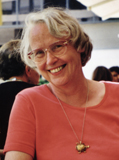Beatrix Heintze was born in Korneuburg near Vienna in 1939. Both of her grandfathers as well as her father held high positions in the textile industry. Due to the turmoil of World War II, Heintze had to move to Leipzig with her mother and sibling in 1944, while her father became a prisoner of war in Russia. He returned to Germany in 1955. Moreover, one of her grandfathers, namely Walter Cramer, was involved in the attempt to assassinate Hitler in 1944. After being denunciated Cramer was arrested and executed.
After the end of World War II Heintze visited school in Naumburg for several years. In 1949 her family resettled in Hannover, where Heintze finished school ten years later. She subsequently took up her studies at the Ludwig-Maximilians-University in Munich. Anthropology, History, Romance Philology and Philosophy were her subjects. Hermann Baumann and László Vajda were among her teachers. Heintze graduated with a Ph D thesis on phenomena of possession in the Middle Bantu region in 1968.
While holding several scholarships (e.g., by the German Research Foundation in 1969/70), Heintze not only learned Portuguese to do archive work but also developed a growing interest in the history and culture of Angola. Furthermore, she took up a position at the Frobenius-Institute in Frankfurt/Main in 1970. The institute, chaired by Eike Haberland, mainly focused its field work and interdisciplinary research on African cultures.
Besides her own scientific work, Heintze took over a large number of further tasks for many years, such as editing publications of the institute as well as for its renowned magazine “Paideuma”. Moreover, Heintze not only continuously deepened her knowledge about the history and culture of Angola through archive research in Portugal but also established the “African Archive” at the Frobenius-Institute in 1995.
Beatrix Heintze retired in 2004 but nonetheless kept researching. Besides her regional focus on Angola and Western Africa she is interested in the methods of historical research and the History of Anthropology.
(Text written by Vincenz Kokot in July 2012, based on an article by Beatrix Heintze in Paideuma, 2007; photo source: http://www.frobenius-institut.de/index.php?option=com_content&task=view&id=186)
Short Portrait: Beatrix Heintze

Beatrix Heintze


